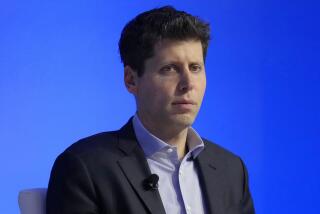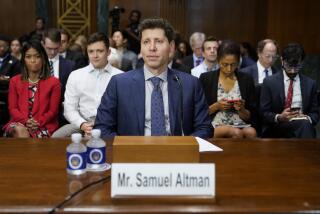Messier’s Key Ally Leaves Board
- Share via
Already struggling to quell the tumult surrounding his company, French media baron Jean-Marie Messier suffered yet another blow Tuesday after his top supporter became the fifth board member to resign this year from Vivendi Universal.
Bernard Arnault, chairman of luxury goods maker LVMH Moet Hennessy Louis Vuitton and one of France’s most respected businessmen, did not explain why he was stepping down from the company’s board of directors. But analysts speculated he and other French board members were frustrated over some of Chief Executive Messier’s recent decisions, including conflicting statements about his plans for Vivendi’s water business.
The departure leaves Messier’s position on the company’s 15-member board more tenuous than ever, analysts said.
“Without question, his resignation will further undermine the confidence investors and board members have in Messier’s ability to lead the company,” said Mark Harrington, a media industry analyst with J.P. Morgan Chase in London.
Although Messier has taken steps to carry out a plan approved by the company’s board last month to reduce its debt load, he has yet to overcome a reservoir of distrust between him and investors. The distrust began earlier this year when the company reported the largest loss in French history and worsened with disclosures of unexpected liabilities and conflicting statements about whether Vivendi would give up its controlling interest in Vivendi Environnement, the world’s largest water company.
Messier expected to get credit this week for selling a 15.6% stake in Vivendi’s water utility to reduce debt. Instead, the timing only heightened speculation that the company was facing a cash crunch, which Vivendi has denied.
It was Arnault who traditionally rallied behind Messier when increasingly pointed criticisms were raised about his strategy. At a meeting in New York last month, Arnault defended Messier when some American board members reportedly questioned whether he should step down.
Arnault’s resignation came the day after Vivendi’s share price dropped to a 13-year low in France. The share price remained stable Tuesday, closing on the New York Stock Exchange at $19.80.
His exit, combined with the other board departures for a variety of reasons, leaves Messier with fewer French board members to act as a buffer against American board members who have been his strongest critics.
Last month, the Vivendi board appointed former Universal Studios head Edgar Bronfman Jr. and Societe Generale’s Marc Vienot to monitor Messier’s stewardship of the company. Although Bronfman has supported Messier, his family, which owns 5% of Vivendi, is reviewing its stake in the company after seeing huge losses in its holdings this year. Bronfman could not be reached for comment.
Messier emerged from Tuesday’s meeting in Paris with the support of the company’s board, a company spokesman said.
The company said it had nominated Dominique Hoenn, a veteran executive at French bank BNP Paribas, to replace Arnault.
Vivendi said it also was on track to meet its financial targets for this year and would seek to reduce its debt by $3.9 billion by the end of the year. But the company plans to begin holding conference calls with investors twice each month “to put an end to negative and continuous rumors about the company.”
Most investors think Messier will hold on to his job for now because of the lack of any obvious successor and the need to maintain stability.
“My guess is, he’ll hang on,” said Dennis Leibowitz, general partner of Act 11 Partners, a hedge fund in New York that has invested in Vivendi. “The operations are doing well. The stock is very cheap.”
Winning back investor confidence, however, will be a formidable challenge for Messier.
Messier needs to continue cutting the company’s $30-billion debt, which credit-rating companies say is excessive. Vivendi amassed the debt after Messier pushed through a series of acquisitions, including Universal Studios and Canal Plus, to transform a water utility into a rival of AOL Time Warner.
Messier also needs to better communicate with the financial community, analysts said. Many were frustrated when the company canceled a meeting it planned with analysts last month to lay out its strategy for the future.
“He needs to come to investors and communicate very clearly with regards to where he sees Vivendi in the next 12 months, to justify the strategy and be consistent with the market,” Harrington said, noting that most investors no longer believe Messier’s vision of using the Internet and cell phones as outlets for movies, music and games.
Vivendi investor relations head Laura Martin defended the company’s communication with investors. She said the company canceled the analyst meeting only because it was focused on a management overhaul at its Canal Plus TV unit. “In the context of the current market, investors have a tendency to infer the worst,” she said.
To some extent, the company has been the victim of market forces beyond its control. In the post-Enron climate, investors have been more unforgiving toward large, complex companies on an aggressive growth path.
“Everyone’s taken a hit,” said Larry Haverty, a money manager with State Street Research & Management in Boston.
Despite problems in Canal Plus and the company’s Internet business, Vivendi still has solid assets in the Universal music, movie and theme park businesses, he said.
Arnault is the fifth board member to quit the board this year.
Rene Thomas, honorary chairman of BNP Paribas, left the board this year to retire.
Jean-Louis Beffa, chief executive of Saint-Gobain, left in April after Vivendi sold its interest in Saint-Gobain.
Philippe Foriel-Destezet, a former chief executive of Adecco, resigned in April because of a conflict.
Pierre Lescure, head of Vivendi’s pay-television unit Canal Plus, left after he was fired in April.
More to Read
Inside the business of entertainment
The Wide Shot brings you news, analysis and insights on everything from streaming wars to production — and what it all means for the future.
You may occasionally receive promotional content from the Los Angeles Times.











